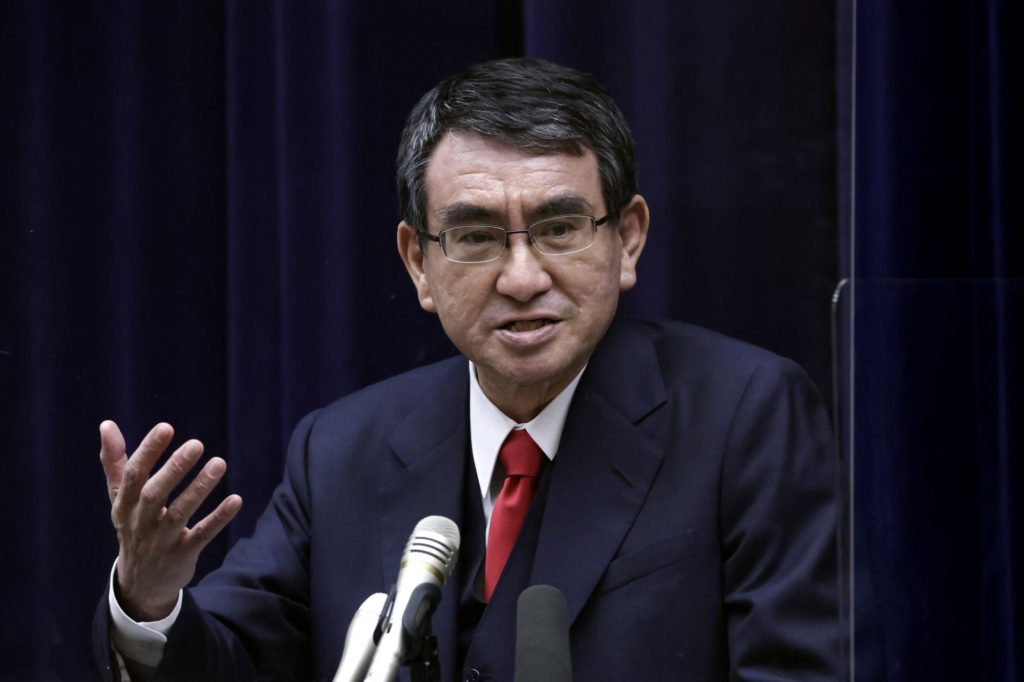(Bloomberg) — With Japanese politics dominated for the past decade by Shinzo Abe and his successor Yoshihide Suga, investors have had limited chances to make trades based on new policies. The opportunity has now arrived.
Suga’s unexpected resignation as prime minister has juiced Tokyo’s markets and stoked speculation over who will succeed him. Several high-profile politicians are lining up, although only former Foreign Minister Fumio Kishida has officially declared his candidacy and unveiled a platform.
“Markets are going to be paying attention to the candidates’ individual policies,” said Tomo Kinoshita, a global market strategist at Invesco Asset Management in Tokyo. Views on energy policy, Japan’s inflation target and Japan’s relationship with China are already being closely parsed.
Regardless of who wins the Sept. 29 leadership vote, the ruling Liberal Democratic Party is expected to perform better in a forthcoming general election than it would have under Suga. Here’s a look at some of the top candidates and the benefits and baggage they might bring to Japan’s top office.
Taro Kono
A favored candidate of foreign investors, a victory for Taro Kono would bring a fluent English speaker into the prime minister’s office. His candidacy is already helping boost sections of Tokyo’s markets, with polling data also showing he’s currently the preferred candidate among the general public.
As administrative reform minister, Kono is known for his opposition to the country’s fax-and paper-based bureaucracy. Having a red-tape buster in power could be good news for firms that sell digitalization solutions, such as Bengo4.Com Inc. or GMO GlobalSign Holdings.
In his recently published book “Moving Japan Forward,” Kono writes about how he was an early advocate for remote work as a young employee at Fuji Xerox Co. That might make him a more convincing candidate than Suga to persuade Japanese firms to support the telework concept.
Here’s Who to Look Out for in the Race to Succeed Japan’s Suga
Kono has also been a vocal opponent of nuclear power in the past. Should he enter the race and win, utilities such as Kansai Electric Power Co., Hokuriku Electric Power Co. and Electric Power Development Co. could be among the losers — furthering sector declines on Monday. On the flip side, renewable energy firms Renova Inc. and eRex Co. could see more gains.
But Norihiro Fujito, chief investment strategist at Mitsubishi UFJ Morgan Stanley Securities Co., cautions against reading too much into Kono’s past comments. “Whether he will actually reflect his previous stance into his policies once the race for the prime minister position begins, is a different story,” he said.
Fumio Kishida
While not as popular with the public as Kono, some nonetheless see Kishida as the current favorite, including analysts as Citigroup Inc. He is the only candidate to have already outlined his platform, which was heavy on responses to the pandemic — playing up the contrast with Suga’s performance.
The medical sector could get a boost from Kishida’s proposal to form a crisis-response center designed to bring pandemic policies under one roof, with the prospect of a Kishida premiership already boosting smaller firms such as Leoclan Co. and Litalico Inc. Other potential beneficiaries could be telemedicine provider M3 Inc. or PCR test-maker Takara Bio Inc.
Japan Travel Stocks Get a Boost From Vaccine Certificate Plan
Kishida said he plans to use “vaccine passports” to normalize economic activity, which might provide sustained support to so-called reopening plays such as rail operators, airlines, travel agents and restaurants.
Sanae Takaichi
While Sanae Takaichi is seen as a longer shot, reports that she may get an endorsement from Shinzo Abe has increased attention on her candidacy. She is seen as the most likely successor to the former prime minister’s “Abenomics” playbook.
“She has the strongest lean towards adopting a reflationary policy,” analysts from Morgan Stanley MUFG Securities Co. wrote in a Sept. 3 note. The report also highlighted her calls for 100 trillion yen in spending on disaster prevention over 10 years. Japan construction and machinery firms would likely benefit from such a plan.
Takaichi is an advocate for more spending on cybersecurity. Meanwhile, in a recent article in the magazine Bungei Shunju, she said Japan should develop quantum-computing prowess and add support to areas where Japan already has technological prowess, such as the power-chips made by Toshiba Corp. and NAND flash memory made by its spin-off Kioxia Holdings Corp.
What else to watch
- Latest reports indicate that popular former Defense Minister Shigeru Ishiba doesn’t plan to run and could back Kono
- Seiko Noda, a former internal affairs minister, told Suga of her plans to run, the Sankei reported Tuesday. She’s seen a dark horse.
- Telecom stocks are already rallying, as none of the candidates is seen likely to continue Suga’s war against high mobile-phone bills
- Analysts have highlighted that Bank of Japan Governor Haruhiko Kuroda’s term ends in April 2023, and the choice of his successor is likely to be a focus for markets next autumn
(Adds latest updates on Ishiba, Noda in ‘What else to watch’ section)
More stories like this are available on bloomberg.com
©2021 Bloomberg L.P.











